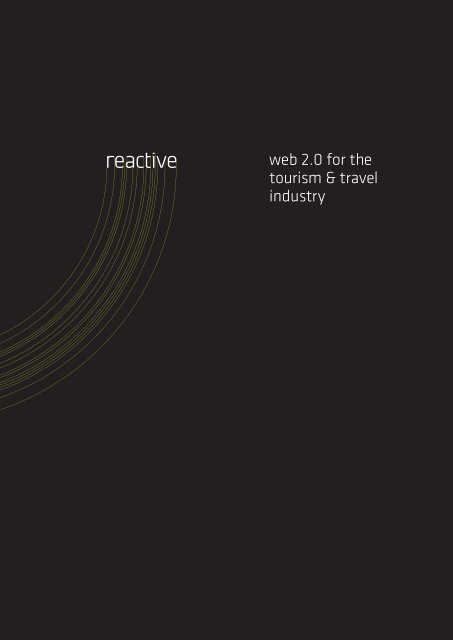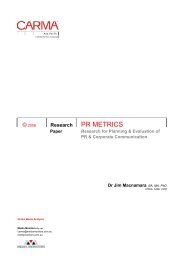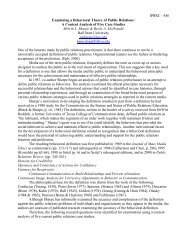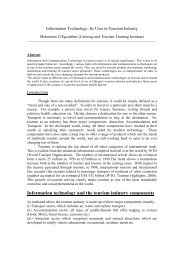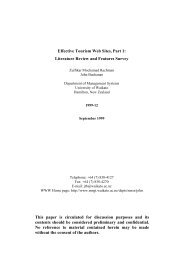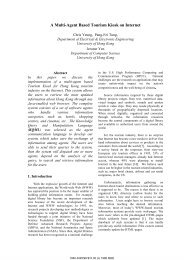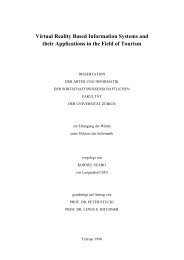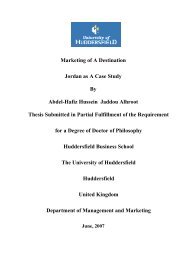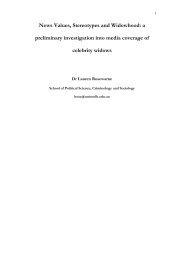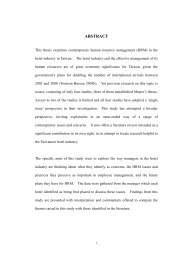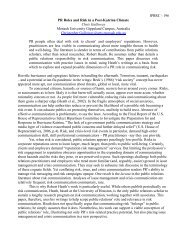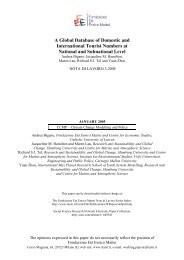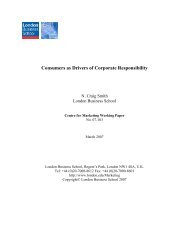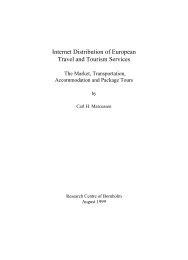web 2.0 for the tourism & travel industry
web 2.0 for the tourism & travel industry
web 2.0 for the tourism & travel industry
You also want an ePaper? Increase the reach of your titles
YUMPU automatically turns print PDFs into web optimized ePapers that Google loves.
<strong>web</strong> <strong>2.0</strong> <strong>for</strong> <strong>the</strong><br />
<strong>tourism</strong> & <strong>travel</strong><br />
<strong>industry</strong>
<strong>for</strong>eword<br />
by Craig Hepburn, Global Web Master, STA Travel<br />
In an <strong>industry</strong> where experience means everything, <strong>the</strong> user-generated content revolution has opened<br />
up a whole new area of opportunities <strong>for</strong> <strong>the</strong> <strong>travel</strong> <strong>industry</strong>.<br />
Travel consumers have until now relied heavily on <strong>travel</strong> journalism and traditional media to help<br />
guide <strong>the</strong>m through <strong>the</strong> best places to go and most exciting things to do. Web technology has now<br />
become more easily accessible and <strong>the</strong> creation of good content has shifted to <strong>the</strong> customer and <strong>the</strong><br />
<strong>travel</strong>ler using blogs, podcasts, wikis and map mashups <strong>the</strong> consumer can share, experience and<br />
research <strong>the</strong>ir own <strong>travel</strong> adventure.<br />
The youth market has also whole-heartedly embraced online social communities to share experiences<br />
and collaborate with peers from o<strong>the</strong>r countries, religions and backgrounds. STA Travel have been<br />
involved in <strong>the</strong>se areas and are extremely excited about <strong>the</strong> opportunities this offers our market. We<br />
offer our customers <strong>the</strong> tools to blog about <strong>the</strong>ir adventure, use Flash applications to plan <strong>the</strong>ir<br />
flights, look up <strong>the</strong>ir friends using mapping technology, and our customers can even subscribe to <strong>the</strong><br />
latest <strong>travel</strong> events and flight offers using RSS. We believe by allowing our customers to decide how<br />
<strong>the</strong>y want to create, read or consume in<strong>for</strong>mation <strong>the</strong>y receive a more personal online experience.<br />
The Web was designed to be a universal space of in<strong>for</strong>mation where everyone could contribute; we are<br />
now seeing <strong>the</strong> true beginning of this revolution.<br />
Craig Hepburn,<br />
Global Web Master,<br />
STA Travel
introduction what is <strong>web</strong> <strong>2.0</strong>?<br />
<strong>the</strong> basics<br />
Web .0 describes <strong>the</strong> second generation of Web-based services that have gained massive popularity<br />
by letting people collaborate and share in<strong>for</strong>mation online in previously unavailable ways. Examples<br />
of <strong>the</strong> use of Web .0 are social networking sites, wikis, blogging and podcasting. With more than<br />
9.5 million citations in Google, Web .0 is clearly generating tremendous interest online and must be<br />
taken seriously by anyone managing a Web strategy.<br />
how does it relate to <strong>the</strong> <strong>tourism</strong> and <strong>travel</strong> <strong>industry</strong>?<br />
As an increasing number of people research and reserve <strong>travel</strong> online, Web .0 is providing consumers<br />
with countless tools to find, and design, not just <strong>the</strong> cheapest trip, but <strong>the</strong> perfect trip.<br />
Recent research has shown that more than 6 in 0 leisure <strong>travel</strong>lers use <strong>the</strong> Internet or an online<br />
service to obtain in<strong>for</strong>mation and prices, fur<strong>the</strong>r highlighting <strong>the</strong> need <strong>for</strong> Tourism and Travel Web<br />
sites to make <strong>the</strong> best possible use of technology to enhance usability, provide useful tools and<br />
increase bookings.<br />
This white paper aims to demystify Web .0, and explain how it can be particularly useful to <strong>the</strong><br />
Tourism and Travel <strong>industry</strong>, allowing brands to better serve customers, and capitalise on <strong>the</strong> new<br />
commercial opportunities that are now available.<br />
ypb&r/ Yankelovich National Leisure Travel Monitor, 006
•<br />
•<br />
•<br />
•<br />
things to<br />
consider<br />
Are you<br />
committed to<br />
frequent updates<br />
of your blog?<br />
Do you have<br />
anything<br />
interesting to<br />
say… on a<br />
frequent basis?<br />
Are you prepared<br />
<strong>for</strong> <strong>the</strong> open<br />
dialogue that<br />
blogs promote?<br />
How will you<br />
promote <strong>the</strong><br />
blog?<br />
blogging<br />
<strong>the</strong> basics<br />
A Web log, or blog, is a Web site where entries are made in journal style and displayed in reverse chrono-<br />
logical order. Blogs often provide commentary on a particular subject, such as food, politics, or <strong>travel</strong>; many<br />
also function as personal online diaries. A typical blog combines text, images, links to o<strong>the</strong>r blogs, Web<br />
pages, and media related to its topic. Blog content can be unpredictable and varied in quality, as <strong>the</strong><br />
technology allows any member of <strong>the</strong> public to create a blog <strong>for</strong> free, in only five minutes.<br />
why create a blog?<br />
There are a number of reasons why companies choose to use blogs on <strong>the</strong>ir Web sites:<br />
•<br />
•<br />
Corporate blogs can solicit direct feedback<br />
from customers, by allowing <strong>the</strong> public to<br />
make comments on blog posts. This is being<br />
used by companies in place of <strong>for</strong>mal focusgroup<br />
testing.<br />
Companies and individuals use blogging to<br />
become recognised as an <strong>industry</strong> expert.<br />
•<br />
•<br />
•<br />
Internet users are frequenting blogs—one in<br />
every 00 UK internet visits went to a blog last<br />
week.<br />
Many companies are blogging as a less <strong>for</strong>mal<br />
(more personal) communication channel.<br />
And of course, a blog can also be used <strong>for</strong> fun<br />
and self expression.<br />
how does it relate to <strong>the</strong> <strong>tourism</strong> and <strong>travel</strong> <strong>industry</strong>?<br />
Among users who seek in<strong>for</strong>mation on <strong>the</strong> Internet, more than a quarter have visited a blog to review<br />
in<strong>for</strong>mation about a destination or <strong>travel</strong> service supplier in <strong>the</strong> last months. This pattern rein<strong>for</strong>ces <strong>the</strong><br />
emerging relevance of <strong>travel</strong> communities as an in<strong>for</strong>mation source.<br />
As blogs are seen as a personal communication channel, visitors tend to see <strong>the</strong>m as a more impartial<br />
source of in<strong>for</strong>mation than corporate Web sites. Consider <strong>the</strong> difference of asking a friend to recommend a<br />
hotel in Brussels, to ringing <strong>the</strong> Hyatt Brussels and asking <strong>for</strong> <strong>the</strong>ir opinion!<br />
Hitwise, October 5, 006<br />
006 ypb&r/Yankelovich National Leisure Travel Monitor, 006
logging examples and potential<br />
•<br />
•<br />
•<br />
5<br />
Starwood have assembled a team of <strong>travel</strong> writers to contribute to <strong>the</strong>ir blog (www.<strong>the</strong>lobby.com)<br />
with <strong>the</strong> aim of helping Starwood Preferred Guests stay on top of <strong>the</strong> latest <strong>travel</strong> trends and build<br />
brand loyalty.<br />
Eurostar have commissioned local Parisians to post blogs on www.voiceofacity.com, creating a<br />
<strong>travel</strong>lers guidebook with a truly ground-roots feel.<br />
STA Travel allow <strong>the</strong> public to browse and create <strong>the</strong>ir own <strong>travel</strong> blogs at<br />
(www.sta<strong>travel</strong>journals.com).<br />
monitoring blogs<br />
By tracking what is discussed in blogs, companies can stay abreast of <strong>the</strong> public’s opinions of <strong>the</strong>ir brand<br />
and that of competitors. It can also be a replacement <strong>for</strong> phone surveys, focus groups, and o<strong>the</strong>r traditional<br />
methods of tracking consumer opinion. There are many Web sites <strong>for</strong> monitoring/searching blogs, each<br />
have <strong>the</strong>ir strengths and weaknesses and are good <strong>for</strong> different purposes;<br />
•<br />
•<br />
Technorati ( www.technorati.com ) is <strong>the</strong> best known and monitors more than 0 million blogs, with<br />
almost four million updated with new content at least once a week.<br />
O<strong>the</strong>rs include Feedster ( www.feedster.com), BlogPulse ( www.blogpulse.com ), Blog Lines<br />
( www.bloglines.com ) and Google’s Blog Search ( http://blogsearch.google.com ).<br />
responding to blogs<br />
Along with <strong>the</strong> good, can also come <strong>the</strong> bad, and companies should expect <strong>the</strong>re is a chance that negative<br />
feedback could appear in <strong>the</strong> blogosphere. Many blogs allow you to ‘comment’ on a posting. For crisis<br />
management this raises an interesting dilemma, should <strong>the</strong> company (or pr firm) respond to a negative<br />
comment, or remain silent?
podcasting<br />
<strong>the</strong> basics<br />
A podcast is an audio file (usually in mp3 <strong>for</strong>mat) that can be downloaded from a Web site. Podcasts are<br />
most commonly downloaded to an iPod, hence <strong>the</strong> name, but can also be used with o<strong>the</strong>r mp3 players.<br />
Users can subscribe to a podcast through iTunes (or similar software) using rss (see page eight). Any new<br />
podcasts will <strong>the</strong>n automatically load onto your iPod.<br />
how does it relate to <strong>the</strong> <strong>tourism</strong> and <strong>travel</strong> <strong>industry</strong>?<br />
Many <strong>travel</strong> Web sites are using podcasts as a way of delivering an audible experience of featured <strong>travel</strong><br />
destinations. Thousands of guidebook podcasts exist, covering almost every destination. Most are free and<br />
can be found on destination sites, online news outlets, and music stores such as iTunes. Recent additions<br />
to iTunes’ podcast section, <strong>for</strong> example, included segments about <strong>the</strong> San Diego Zoo’s monkey enclosure,<br />
<strong>the</strong> Texas city-island of Galveston, and Chicago’s Millennium Park.<br />
Creating a podcast can be cheap and easy, and so it’s not just big brands that are making podcasts—<br />
ordinary people are recording <strong>the</strong>ir own opinions and observations about <strong>the</strong>ir trips. Type in <strong>the</strong> words ‘Los<br />
Angeles’ in iTunes’ podcast section and LA bound <strong>travel</strong>lers will find a host of opinions about <strong>the</strong> best of<br />
Sou<strong>the</strong>rn Cali<strong>for</strong>nia, including Foodcast, a show about Los Angeles restaurants.<br />
examples and potential<br />
•<br />
•<br />
•<br />
•<br />
•<br />
6<br />
Lonely Planet are providing free destination-based podcasts at www.lonelyplanet.com/podcasts<br />
The online <strong>travel</strong> agency, Orbitz offers audio descriptions of <strong>travel</strong> destinations at<br />
www.orbitzinsider.com<br />
Virgin Atlantic has a trial of nine podcasts with destination-based content, which include sound effects<br />
and music in addition to commentary. See http://virginatlantic.loudish.com<br />
The UK’s Independent newspaper (http://<strong>travel</strong>.independent.co.uk) has launched a <strong>travel</strong> podcasting<br />
service exclusively with mobile phone company Vodafone. Each podcast is presented by Simon Calder,<br />
The Independent’s <strong>travel</strong> editor.<br />
Independent companies such as HeartBeat Guides (www.heartbeatguides.com) and Soundwalk<br />
(www.soundwalk.com) have been launched offering destination podcasts <strong>for</strong> sale.
social networking & user-generated<br />
content<br />
<strong>the</strong> basics<br />
Social networking describes <strong>the</strong> trend towards Web sites becoming ga<strong>the</strong>ring places where relationships<br />
are <strong>for</strong>med among a great number of people in a virtual space. Until recently content on <strong>the</strong> Internet was<br />
created and published by business, but with <strong>the</strong> rise of sites such as MySpace and YouTube <strong>the</strong> Internet<br />
community is now creating, not just consuming content.<br />
how does it relate to <strong>the</strong> <strong>tourism</strong> and <strong>travel</strong> <strong>industry</strong>?<br />
First and <strong>for</strong>emost, social networking sites let Web users communicate with each o<strong>the</strong>r in an extremely<br />
efficient way, by enabling <strong>the</strong>m to congregate around specific interests (such as a holiday destination).<br />
Social networks empower <strong>travel</strong>lers and, in one respect, enable <strong>the</strong>m to operate outside <strong>the</strong> establish-<br />
ment, sharing in<strong>for</strong>mation and ideas (such as hotel or destination reviews) that are unfiltered and free of<br />
marketing bias. Established online <strong>travel</strong> Web sites (such as Yahoo! Travel) have <strong>the</strong> benefit of a high<br />
volume of site visitors, and many are embracing Web .0 to enable this customer base to create online<br />
communities, driving repeat visitation and loyalty.<br />
examples and potential<br />
The potential <strong>for</strong> businesses to leverage <strong>the</strong> power of social networks is substantial. Many big <strong>travel</strong><br />
brands have embraced user-generated content, and are exploring building social networks.<br />
•<br />
•<br />
•<br />
•<br />
TripAdvisor (www.tripadvisor.com) was among <strong>the</strong> first to capitalise on <strong>the</strong> opportunities of Web .0,<br />
and a range of general and niche social-based start-ups have followed suit. The site boasts ,000<br />
featured destinations, and is among <strong>the</strong> top ten visited Travel Web sites in <strong>the</strong> UK .<br />
Yahoo! has been busy integrating a range of Web .0 tools with its new Trip Planner tool (http://<strong>travel</strong>.<br />
yahoo.com/trip), which enables <strong>travel</strong>lers to view and rank trip plans produced by its large customer base.<br />
Travel companies such as Contiki have creating dedicated MySpace Home pages ( www.myspace.com/<br />
contiki ) featuring <strong>travel</strong>lers comments and featured offers, and allowing o<strong>the</strong>r MySpace users to sign<br />
up as ‘Friends’.<br />
Designated as a community space <strong>for</strong> <strong>travel</strong>lers, <strong>the</strong> revamped Sheraton Web site (www.sheraton.com)<br />
encourages visitors to share stories, advice and photos relating to <strong>the</strong>ir <strong>travel</strong> discoveries, favourite<br />
destinations, etc. Sheraton management says <strong>the</strong> portal is a reflection of how people now research and<br />
buy <strong>the</strong>ir trips.<br />
Hitwise, March 0 , 006
online video<br />
<strong>the</strong> basics<br />
Around three quarters of all home internet users in <strong>the</strong> UK ( million people) now have a broadband<br />
connection . With <strong>the</strong> rise in availability of broadband, so too has <strong>the</strong> commercial viability of uploading and<br />
viewing video online.<br />
As of mid 006 <strong>the</strong>re are tens of millions of video clips available online, with Web sites dedicated entirely<br />
to offering free video clips to users, and many established sites adding video content. While some video<br />
clips are taken from broadcast media, user-generated video has become incredibly popular (most promi-<br />
nantly with YouTube).<br />
Video is being used online in a myriad of ways, from online advertising, to social networking, to rich media<br />
Web sites.<br />
how does it relate to <strong>the</strong> <strong>tourism</strong> and <strong>travel</strong> <strong>industry</strong>?<br />
For <strong>travel</strong> and <strong>tourism</strong> operators, online video provides <strong>the</strong> ability to create a depth of engagement that,<br />
until now, has been restricted to tv <strong>travel</strong> shows. Care needs to be taken when relying on video to provide<br />
an online experience, as visitors on slower Internet connections will find <strong>the</strong> delayed load times frustrating,<br />
damaging your brand’s reputation.<br />
Alongside professional video, many holidaymakers are <strong>travel</strong>ling with digital video cameras and uploading<br />
<strong>the</strong>ir footage to sites such as those listed below. It is now possible to search <strong>for</strong> user-generated video and<br />
explore <strong>the</strong> real sites and sounds of a holiday destination.<br />
examples and potential<br />
•<br />
•<br />
•<br />
YouTube ( www.youtube.com) is set to become <strong>the</strong> most popular online video Web site . YouTube<br />
allows users to create <strong>the</strong>ir own <strong>travel</strong> profiles and itineraries, post videos of <strong>the</strong>ir trips, and comment<br />
on each o<strong>the</strong>r’s posts.<br />
The new site Travelistic (www.<strong>travel</strong>istic.com) bills itself as <strong>the</strong> ‘YouTube <strong>for</strong> <strong>travel</strong>’, and combines<br />
user-generated video with professionally produced programming, some of which is exclusive to <strong>the</strong> site.<br />
The company plans to move into content creation, with a <strong>travel</strong>-<strong>the</strong>med ‘video podcast’ in <strong>the</strong> making.<br />
The MGM Grand Las Vegas have been lauded <strong>for</strong> <strong>the</strong> rich use of video in <strong>the</strong> ‘Maximum Vegas’ section of<br />
<strong>the</strong>ir corporate Web site (www.mgmgrand.com), demonstrating <strong>the</strong> experience and facilities of <strong>the</strong> hotel.<br />
bmrb, January 006<br />
Hitwise, September 006
To subscribe to<br />
an rss feed,<br />
first choose an<br />
rss-reader, and<br />
<strong>the</strong>n look out <strong>for</strong><br />
<strong>the</strong>se symbols<br />
rss<br />
<strong>the</strong> basics<br />
rss is a file <strong>for</strong>mat that is used to subscribe to content updates such as blogs, latest news, offers or<br />
podcasts. To view a subscription, you require an rss reader, of which <strong>the</strong>re are many available such as:<br />
FeedDemon, NewsGator, Rojo and Spotback. There are also alternatives such as Google Home page,<br />
MyYahoo or Windows Live Space. By selecting an rss feed on a topic of interest, you can keep track of a<br />
large number of your favourite Web sites or blogs, without having to remember to check each site manually<br />
or clutter your inbox.<br />
how does it relate to <strong>the</strong> <strong>tourism</strong> and <strong>travel</strong> <strong>industry</strong>?<br />
Online <strong>travel</strong> agencies, airlines, even hotels, have launched rss feeds in <strong>the</strong> past year, primarily focused on<br />
<strong>travel</strong> deals and advertised specials. It is relatively easy and economical <strong>for</strong> <strong>travel</strong> companies to test out<br />
feeds as a supplemental means of communicating with more tech-savvy <strong>travel</strong>lers.<br />
The main benefits/features of rss are:<br />
•<br />
•<br />
•<br />
•<br />
•<br />
9<br />
rss feeds entice subscribers to visit <strong>the</strong> Web sites mentioned in <strong>the</strong> feed, much like <strong>the</strong> links in an<br />
eNewsletter.<br />
rss content does not have to compete with email and spam <strong>for</strong> <strong>the</strong> users’ attention. It’s more likely<br />
that your message delivered via rss will get through to <strong>the</strong> users.<br />
rss feeds work well <strong>for</strong> search engine positioning because <strong>the</strong>y help get inbound links from o<strong>the</strong>r Web<br />
sites. Feeds are also an excellent way to let <strong>the</strong> search engines know that <strong>the</strong>re is new content to be<br />
indexed.<br />
rss feeds can be used to syndicate content to o<strong>the</strong>r Web sites, <strong>the</strong>reby expanding <strong>the</strong> original site’s<br />
readership and reach.<br />
Many rss readers allow users to <strong>for</strong>ward items in rss feeds to <strong>the</strong>ir friends, family and co-workers,<br />
much like <strong>the</strong> viral marketing ‘<strong>for</strong>ward this message’ feature in eNewsletters.<br />
examples and potential<br />
•<br />
•<br />
Many <strong>travel</strong> agencies such as Expedia (www.expedia.com), STA Travel (www.sta<strong>travel</strong>.com), Virgin<br />
Holidays (www.virginholidays.co.uk) and Orbitz (www.orbitz.com) offer customers <strong>the</strong> opportunity to<br />
automatically receive new promotions via rss as soon as <strong>the</strong>y’re posted on <strong>the</strong> site.<br />
The Conde Nast Web site Concierge.com (www.concierge.com) delivers insider recommendations on<br />
<strong>the</strong> world’s greatest destinations via rss.
tagging<br />
<strong>the</strong> basics<br />
Tagging is a new way of categorising in<strong>for</strong>mation online. Any piece of content (such as a blog post) can be<br />
assigned multiple tags, and will <strong>the</strong>n appear under each of <strong>the</strong>se as categories. This is a break from <strong>the</strong><br />
strictly linear navigation of Web sites pre-Web .0. Tagging is particularly common in user-generated<br />
content sites and <strong>the</strong> blogging world.<br />
how does it relate to <strong>the</strong> <strong>tourism</strong> and <strong>travel</strong> <strong>industry</strong>?<br />
Consumers are increasingly turning to tagging to sift, sort, and share in<strong>for</strong>mation about <strong>travel</strong> planning<br />
and buying. Imagine if you could somehow view <strong>the</strong> collective <strong>travel</strong> planning knowledge of everyone that<br />
has been be<strong>for</strong>e you, effectively eliminating all of <strong>the</strong> dog-eared journals and underlined notes in <strong>travel</strong><br />
guides. Well, this is exactly what is occuring with tagging.<br />
Broadly speaking, tagging is used <strong>for</strong> two purposes: saving and sorting your own content, and browsing<br />
o<strong>the</strong>r people’s content.<br />
Suppose you are considering a trip to Paris. Naturally you start your online <strong>travel</strong> planning journey by<br />
searching <strong>for</strong> ‘<strong>travel</strong> to Paris France’ in a search engine, where no less than 9 million results are returned.<br />
Perhaps you refine your search, and begin to visit some of <strong>the</strong> referenced pages. As you visit <strong>the</strong>se pages,<br />
you save or “tag” those you like with a service such as Del.icio.us (www.de.licio.us), in a process similar to<br />
identifying browser favourites. Perhaps you tag a museum’s Web site with “must visit”, “Van Gogh” and<br />
“Montmartre”. As you tag items, a ‘tag cloud’ is created, sorting <strong>the</strong> items of interest, which can be used as<br />
an anchor point <strong>for</strong> future searching and tagging.<br />
0<br />
museums<br />
accommodation<br />
airport<br />
bars beer bicycling brussels friends<br />
gallery<br />
activity<br />
art<br />
mont marte<br />
paris<br />
louvre marais<br />
must visit van gogh<br />
tag cloud example
A feature of sites such as Del.icio.us is <strong>the</strong> ability <strong>for</strong> ano<strong>the</strong>r <strong>travel</strong>ler to Paris to browse o<strong>the</strong>r people’s<br />
tagged Web pages, providing content of much greater relevance.<br />
A fur<strong>the</strong>r type of tagging is <strong>the</strong> newly popular geotagging, which is <strong>the</strong> process of adding longitude and<br />
latitude tags to content, which <strong>the</strong>n allows content to be displayed geographically on a map. This technol-<br />
ogy is still emerging, with some newer mobile phones allowing photos to be automatically geotagged with<br />
<strong>the</strong> current location of <strong>the</strong> photo, and uploaded to sites such as Flickr.<br />
examples and potential<br />
•<br />
•<br />
Flickr (www.flickr.com) allows users to store, search, sort and share <strong>the</strong>ir photos. Tagging allows users<br />
to categorise each of <strong>the</strong>ir photos making it easier <strong>for</strong> o<strong>the</strong>rs to find images under <strong>the</strong> same tag.<br />
Travelling to Venice? Search ‘Venice’ to see o<strong>the</strong>r people’s photos. Flickr also allows users to geotag,<br />
upload photos, and <strong>the</strong>n display <strong>the</strong>se on a world map (www.flickr.com/groups/world/pool/map).<br />
Travbuddy (www.travbuddy.com) is a site <strong>for</strong> sharing <strong>travel</strong> experiences with o<strong>the</strong>rs and includes<br />
popular tags <strong>for</strong> global destinations along with a tag search feature.
mash-ups & open apis<br />
<strong>the</strong> basics<br />
‘Mash-up’ is a term <strong>for</strong> seamlessly combining two (or more) different sources of in<strong>for</strong>mation to create a<br />
new experience. The most common is <strong>the</strong> combination of Google Maps with o<strong>the</strong>r in<strong>for</strong>mation (e.g. cycling<br />
routes).<br />
An Open api is <strong>the</strong> technology that makes Mash-ups possible. By providing <strong>the</strong>ir software as an Open api,<br />
companies such as Google, Flickr, YouTube and Del.icio.us allow <strong>the</strong> public to create limitless<br />
combinations of <strong>the</strong>se services.<br />
how does it relate to <strong>the</strong> <strong>tourism</strong> and <strong>travel</strong> <strong>industry</strong>?<br />
Mash-ups have already been embraced by <strong>the</strong> <strong>travel</strong> and <strong>tourism</strong> <strong>industry</strong> to a great extent, <strong>the</strong> most<br />
common being <strong>the</strong> combination of Google Maps with o<strong>the</strong>r sources of in<strong>for</strong>mation (such as hotel<br />
locations).<br />
Still a nascent technology, currently only a small number of technology companies are providing Open apis<br />
<strong>for</strong> <strong>the</strong>ir software/Web sites. Over time this range will grow, and so too will <strong>the</strong> opportunities.<br />
Consider how maps, images, movies, sounds and reviews can all be combined to give a very real idea of<br />
what a destination has to offer. If you see functionality from a site that you like, explore to see if <strong>the</strong>y offer<br />
an Open api, and consider mash-ups as a way to present content in new and interesting ways.<br />
examples and potential<br />
•<br />
•<br />
•<br />
•<br />
•<br />
The ‘Random Day Out Generator’ (www.randomdayout.co.uk) by Locale combines a number of data<br />
sources to create a mapped itinerary, using Virtual Earth (Microsoft’s equivalent of Google Maps).<br />
Virtual Tourism (www.virtual<strong>tourism</strong>.blogspot.com) combines <strong>travel</strong> destination in<strong>for</strong>mation from a<br />
variety of sources; text from Wikipedia, maps from Google Maps and video from YouTube.<br />
The Blogabond World Browser (www.blogabond.com/WorldBrowser.aspx) is a great way <strong>for</strong><br />
<strong>travel</strong>lers to explore blogs and stories in a visual way, mashing-up user-generated content with Google Maps.<br />
43 Places (www. places.com) works in a similar way and combines Flickr photos, rss feeds and<br />
Google Maps with tagging and user-generated content, allowing users to share <strong>the</strong>ir favourite destinations.<br />
Meanwhile, Trip Advisor (www.tripadvisor.com/LocalMaps-g60 6 -New_York_City-Area.html)<br />
displays hotel rates on a Google Map of New York.
wikis<br />
<strong>the</strong> basics<br />
A wiki is a type of Web site that allows site visitors to easily add, remove and o<strong>the</strong>rwise edit and change<br />
<strong>the</strong> site’s content, normally without <strong>the</strong> need <strong>for</strong> registration. The most popular of which is Wikipedia,<br />
which is <strong>the</strong> most popular Education/Reference Web site in <strong>the</strong> UK .<br />
The term wiki can also refer to <strong>the</strong> collaborative software itself (wiki engine) that facilitates <strong>the</strong> operation<br />
of such a Web site.<br />
how does it relate to <strong>the</strong> <strong>tourism</strong> and <strong>travel</strong> <strong>industry</strong>?<br />
In <strong>the</strong> past, publishers such as Lonely Planet and Rough Guides have paid a long chain of contributors to<br />
get a Paris Guide into bookstores and <strong>travel</strong>lers hands; authors, editors, designers, printers, distributors...<br />
<strong>the</strong> list goes on.<br />
A wiki streamlines this process to one person—you!. If you have an opinion on a given topic, a wiki will let<br />
you share this with <strong>the</strong> world, <strong>for</strong> example visit http://wiki<strong>travel</strong>.org/en/Paris, click on <strong>the</strong> ‘Edit’ link and<br />
start writing.<br />
There is considerable debate over whe<strong>the</strong>r in<strong>for</strong>mation found on wikis is factually accurate, as <strong>the</strong>re is no<br />
(or little) <strong>for</strong>mal editorial control. Instead, this control is put in <strong>the</strong> hands of <strong>the</strong> public. For example, if an<br />
eager Paris Hotelier describes <strong>the</strong>ir property as ‘<strong>the</strong> best hotel in Marais’, be<strong>for</strong>e long ano<strong>the</strong>r visitor will<br />
correct or delete <strong>the</strong> entry.<br />
In fact, a study by <strong>the</strong> British scientific journal, Nature showed that Wikipedia comes close to<br />
Encyclopaedia Britannica in terms of accuracy .<br />
examples and potential<br />
•<br />
•<br />
•<br />
Wiki<strong>travel</strong> (www.wiki<strong>travel</strong>.org) is a project to create a free, complete, up-to-date, and reliable world-<br />
wide <strong>travel</strong> guide. So far <strong>the</strong>y have ,000 destination guides and o<strong>the</strong>r articles written and edited by<br />
Wiki<strong>travel</strong>lers from around <strong>the</strong> globe.<br />
World66 (www.world66.com) follows suit, allowing visitors to browse and edit destination content.<br />
TripAdvisor (www.tripadvisor.co.uk) have recently launched <strong>the</strong> TripAdvisor Wiki, allowing visitors to<br />
edit <strong>travel</strong> guides to support <strong>the</strong> large number of existing <strong>travel</strong> reviews.<br />
Hitwise, May 006<br />
Nature Journal, December 005
ajax<br />
<strong>the</strong> basics<br />
ajax is shorthand <strong>for</strong> Asynchronous JavaScript And xml, and is a development technique <strong>for</strong> creating<br />
interactive Web applications. The intent is to make Web pages more responsive by exchanging small<br />
amounts of data with <strong>the</strong> server behind <strong>the</strong> scenes, so that <strong>the</strong> entire Web page does not have to be<br />
reloaded each time <strong>the</strong> user makes a selection. This <strong>the</strong>n increases <strong>the</strong> Web page’s interactivity, speed<br />
and usability.<br />
how does it relate to <strong>the</strong> <strong>tourism</strong> and <strong>travel</strong> <strong>industry</strong>?<br />
When applied appropriately, ajax can make Web sites more responsive and give users more contextual<br />
in<strong>for</strong>mation without needing to refresh <strong>the</strong> browser. This is a growing area, and one that established <strong>travel</strong><br />
companies are well positioned to capitalise on. A better user experience may well be <strong>the</strong> key to shift loyalty<br />
among online <strong>travel</strong> agencies.<br />
Many flight fare aggregators are using ajax to create a fast and seamless user experience when sorting<br />
through a large number of flight options.<br />
examples and potential<br />
•<br />
•<br />
•<br />
•<br />
Kayak (www.kayak.com) aggregates fares from over 00 airlines, and uses ajax to provide a great user<br />
experience. In particular, when viewing available flights you can choose to filter results by Airline, Stops,<br />
Departure Time or Airports—doing so dynamically updates <strong>the</strong> search results, instead of reloading a<br />
new page with each change.<br />
Sidestep (www.sidestep.com) provides a similar service and can search flights, hotels, cars, vacation<br />
packages and activites.<br />
Farecast (www.farecast.com) is <strong>the</strong> first airfare prediction Web site. They aim to help online <strong>travel</strong><br />
shoppers save money by answering <strong>the</strong> question; should you book now or wait <strong>for</strong> a cheaper fare?<br />
Google Maps (http://maps.google.com) elegantly uses ajax to allow <strong>the</strong> user to scroll, pan and zoom<br />
maps without reloading <strong>the</strong> page.
final word<br />
Many marketers are already experimenting with Web .0, and some have moved on to commercialising it.<br />
Web .0 provides fantastic opportunities to those <strong>travel</strong> and <strong>tourism</strong> marketers who are willing to<br />
understand and embrace it.<br />
Tim O’Reilly (<strong>the</strong> technology publisher who coined <strong>the</strong> term ‘Web .0’) described it as ‘an attitude ra<strong>the</strong>r<br />
than a technology’. The common bond of social networks, wikis, rss, podcasts et al, is that Web-based<br />
in<strong>for</strong>mation is now in <strong>the</strong> hands of <strong>the</strong> public, and <strong>the</strong>y can create, share, listen, read and even sell this<br />
in<strong>for</strong>mation in ways that suit <strong>the</strong>m.<br />
The result is a myriad of new ways to engage with customers, build loyal communities, and maximise<br />
online revenue through your <strong>travel</strong> and <strong>tourism</strong> Web site.<br />
If you are interested in discussing how Web <strong>2.0</strong> can benefit your business, please contact Reactive on <strong>the</strong><br />
details below.<br />
get in touch<br />
Please contact us to discuss your online<br />
communication requirements.<br />
5<br />
melbourne<br />
Ph +6 (0) 9 5<br />
Fax +6 (0) 9 5 99<br />
Email melbourne.enquiries@reactive.com<br />
sydney<br />
Ph +6 (0) 9 9 0 0<br />
Fax +6 (0) 9 0<br />
Email sydney.enquiries@reactive.com<br />
london<br />
Ph + (0) 0 0 5 5<br />
Email uk.enquiries@reactive.com


